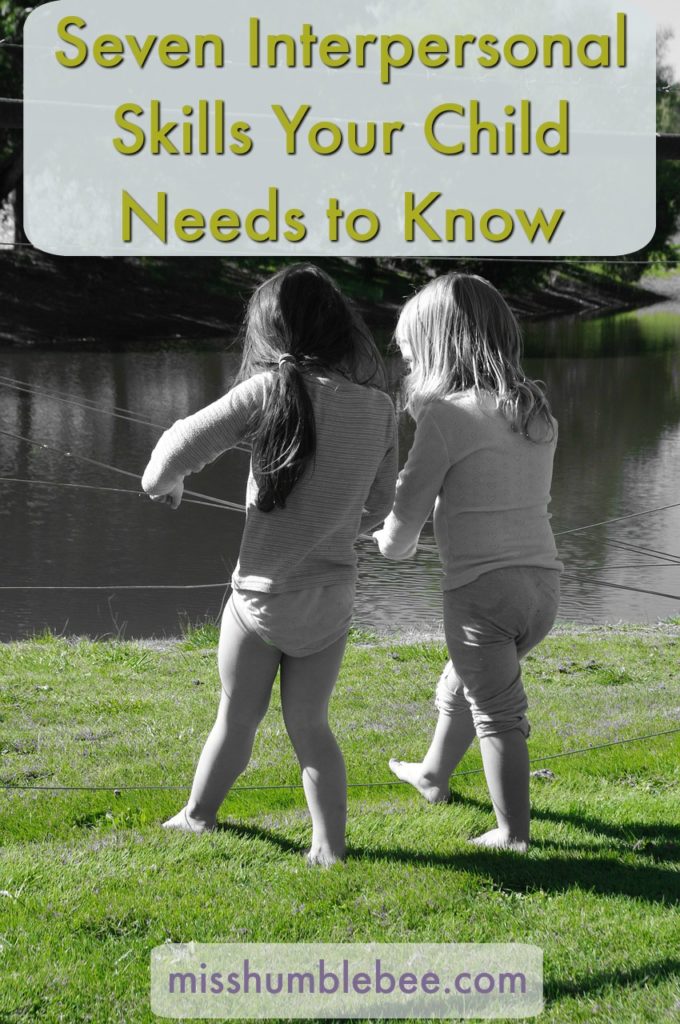Communication. It’s a simple word, one we often take for granted as something that children learn naturally. We know we need to teach our kids academic skills, but often forget that interpersonal skills also need to be taught.
So much of life, including our personal relationships, work relationships, and political relationships to name only a few, hinge on good interpersonal skills, but it’s about so much more than simply talking.
The following list contains seven interpersonal skills that children should learn and then practice on a regular basis. Though mastery of these skills is an ongoing and lifelong process, the more opportunities your child has to flex her interpersonal muscles, the stronger her skills will become.
Seven Interpersonal Skills Your Child Needs to Know
Verbal Communication- Often when we think of interpersonal skills, this is the one that comes to mind. We wait eagerly for our child’s first word, love listening to his burgeoning vocabulary, and enjoy carrying on conversations with him when he start stringing words together to form sentences and paragraphs. Of the seven, this skill is probably the most natural to learn because opportunities to observe and practice verbal communication abound in daily life.
Non-verbal Communication- From birth, children begin to pick up on the subtleties of non-verbal communication. A facial expression, the unspoken tension in a stressful moment, hand gestures: They all can be observed and interpreted. While words can sometimes be misinterpreted, non-verbal communications have an even higher chance of misinterpretation. It’s important therefore to not only teach children to ‘read’ these signals through a filter, but also to be careful with their own non-verbal communications.
Listening Skills- If one of the seven skills is most important, this one has a good chance of being the winner. In a world where we can voice our opinions in a comment section without even knowing the full story, listening has become a lost art and one that we sorely need. Teaching children to listen to others and really hear what they’re saying, whether they agree with them or not, is a skill that will serve them well through their entire lives.
Negotiation- Some would say that children are born with this ability and it does seem that some kids are naturally gifted in the art of negotiation. However, this skill becomes especially important in teaching children to deal with disagreements among their peers. For instance, if two children want to use the same toy, being able to negotiate will allow them to come to a solution with which they are both happy.
Problem Solving- Ask a handful of employers what they’re looking for in employees today and ‘problem solvers’ will be named as one of the most important attributes time and again. Unfortunately, children are given few opportunities to practice this skill, even though it’s more important than ever.
Decision Making- Giving children opportunities to make decisions in their day-to-day lives can be as easy as offering them two options for lunch. As they become adept at weighing the pros and cons of small choices, they can be presented with opportunities to make bigger decisions.
Assertiveness- Though the term assertive sometimes has negative connotations, at it’s essence assertiveness is simply the ability to communicate needs and wants.
Feeling a bit overwhelmed? These resources will help you teach your child the interpersonal skills they need!
How You Can Help Children Solve Problems :: Scholastic
Kindergarten Readiness: Preparing Your Child Socially :: Miss Humblebee’s Academy Blog
Teaching Kids Non-Verbal Communication :: BetterParenting
Teaching Your Kid to Make Good Decisions :: Parents
Can Children Learn to Negotiate? :: Psychology Today
10 Tips for Teaching Assertiveness Skills :: Practical Parenting
If you haven’t already, check out our new DIY: Unplugged section. It’s full of fun and educational activities, games, crafts, and more that you can do offline.











